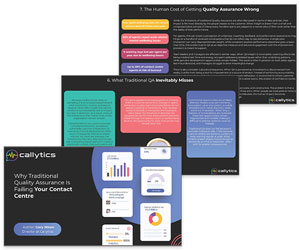Good customer service is like a busy racetrack in winter – to perform at your best, there are certain hurdles you’ll need to negotiate.
In this article George Dixon looks at the six biggest barriers to giving good service, and how to overcome them.
1. Your Staff Are Held Back by Mediocre Software
Whilst it’s been said that a bad workman blames his tools, it’s also true that bad tools can often be blamed for making workmen bad in the first place. At the very least, sub-standard apparatus can greatly hinder a person from reaching their maximum potential.
Have you ever come across a champion sprinter training in wellies, or a Michelin Star chef working with bad quality cookware? Likewise, you’re unlikely ever to see an outstanding contact centre agent using software that’s just not fit for purpose.
Bad internal programs are often poorly designed and difficult to use, meaning an inevitable increase in human error on the part of agents.
Poor software is also likely to be slower, more glitchy and less reliable than the industry standard, meaning more instances of customers having to be placed on hold, and a subsequent increase in overall call times.
The ill-conceived infrastructure of these systems can also mean that simple processes, such as refunds, have to be completed over five or six stages, rather than the one or two steps enjoyed by superior programs.
They often look bland and messy, too, which can have a subtle but powerful knock-on effect on staff morale.
The procurement of weak software can ultimately lead to an increase in repeat calls – and a proportionate decrease in caller satisfaction.
And the worst part of all is that customers, oblivious to your staff’s working conditions, will consider the bad service received to be the result of general carelessness on the part of agents, rather a consequence of the sub-par programs they’re being forced to use.
To avoid these problems, and see strong results in the long term, be sure to invest in a robust, tried-and-tested software package that enables your staff to do their job to the best of their ability. Your employees, customers and shareholders alike will thank you for it in the end.
Read our article Call Centre Software: What Should You Be Looking Out For? to find out what types of software you could be using
2. Your Agents Lack Good Soft Skills
A lack of decent soft skills training can mean the difference between a good customer experience and a bad one – even if the complaint itself ends up being resolved during the call.
This is because, when a customer comes into contact with an advisor who’s been rude, discourteous, or condescending, they’ll come away from the call feeling unappreciated and undervalued. And if there’s one thing customers don’t like, it’s feeling that their custom is being taken for granted.
Now imagine the opposite scenario:
The customer calls in with an identical query, but this time, they’re connected to a different agent.
Instead of interrupting, rushing and generally speaking down to the caller, this one listens patiently, uses verbal nods appropriately, and treats the customer with a good deal of empathy and respect.
Beyond this, the agent builds rapport by taking the caller’s age, location and dialect into account, and adjusting their telephone manner accordingly.
It isn’t hard to see which of these customers will be inclined to keep shopping with you, and which is more likely flee to one of your more courteous competitors. This is because customers tend to consider technical and procedural difficulties to be a lot more forgivable than a bad attitude.
There are two main causes of poor agent soft skills.
- The first is the absence of an effective training programme. This can be solved by ensuring that your internal training procedures are reviewed regularly, and that agents’ training sessions are held on an annual basis, if not much more frequently than that.
- The second cause generally comes down to employee dissatisfaction and/or complacency, which is a more sensitive issue that’s a little trickier to tackle.
In short, providing your customers with excellent soft skills is a golden opportunity to outshine your competitors, and to demonstrate to callers just how much you appreciate their loyalty.
This, in turn, will help to mould their perception of your company, and assure them that you’re very much worth sticking with in the long term.
For more information on developing soft skills, read our article: Customer Service Skills: How to Improve Empathy, Active Listening and Knowledge
3. Escalation Requests Are Blocked or Discouraged
When customers ask to speak to a manager, they usually have a very good reason for doing so; generally, they know from experience that their complaint is too complex for a regular agent to resolve, and that attempting to do so would just be a waste of your time, and theirs.
Unfortunately, many agents are reluctant to escalate complaints, for fear of being deemed incompetent by management.
Worse, many managers actively discourage agents from escalating calls, presumably because they already have a considerable workload of their own.
But whilst shrugging off escalation requests may seem a good short-term solution, in the long term it will only exacerbate things further.
When escalations are denied or ignored, customers begin to feel they’ve hit a brick wall, and will eventually take things into their own hands.
Whether this means leaving a series of scathing reviews online, or contacting your Board of Directors for help, the situation will likely come back to bite you.
You’ll end up not only having to defend your reputation online and potentially offer compensation – you could also find yourself having to explain the situation to senior management.
In short, customers who wish to have their complaint escalated will do so, whether with your help or without it. It therefore makes sense to comply with escalation requests immediately, regardless of the reason for that request.
Even in situations where it isn’t feasible to transfer the call directly, it is always possible to promise a call back from a manager, and to ensure that that promise is fulfilled.
Doing so will not only reassure your customers that their requests are taken seriously, it will also help prevent the situation from spiralling out of control and becoming a lot more serious than it needs to be.
For great advice on the best ways to deal with a customer who wants to escalate a call, read our article: How to Handle Escalation Calls
4. Your Workforce Is Too Large
Cliché or not, it happens to be true: too many cooks really do spoil the broth.
When you have too many agents in your workforce, a long list of problems can ensue. For example, staff without enough work to do are prone to boredom, which, in turn, can lead to the development of numerous bad habits.
Chitchatting with colleagues within earshot of ongoing calls, eating at their desk, disappearing for unscheduled breaks – all of these issues can quickly appear when you find your contact centre overstaffed.

Furthermore, bored agents may be tempted to peruse their mobile during work hours, which poses a serious security risk in terms of the protection of customer data.
As well as these behaviours, bored staff can become demotivated and allow their quality of work to suffer. They may begin to cut corners on the corporate script, for instance, or to address their callers casually, or to leave customers on hold for unnecessary periods of time.
This is because their working environment has begun to feel overly familiar (more like a home than an office) and, sometimes subconsciously, their mannerisms have adapted for the worse.
To a certain extent, finding the optimum number of staff for your operation is a case of trial and error. More intricate forecasting will help you to plan better in the future, but for now, try diverting surplus staff into busier teams and departments, where they can offer support whilst also gaining experience for their future development.
Intelligently managed, this could in fact improve the efficiency of your company as a whole, since a cross-trained workforce is a more versatile one – meaning a reduced impact from employee absence, and increased ease in redistributing staff across the business in response to unexpected events.
5. Your Workforce Is Too Small
On the other side of the spectrum, having a workforce that’s too small can be equally detrimental your operation.
When your teams are understaffed, the agents within them will become subject to an excessive workload, and the unhealthy levels of stress that follow.
Left unchecked, they may eventually decide that there’s no option but to jump ship, hence snowballing the problem even further.
To illustrate why understaffing is such a huge obstacle to good customer services, let’s summarize a day in the life of an overworked inbound agent.
It goes like this:
You arrive at work, on time, and go to your workstation. Your manager, still highly strung from yesterday’s chaos (and dreading the day to come), hasn’t the time to offer you anything but a grunt of acknowledgement. Nor do the other agents in your team.
You reflect for a moment about how nice it would be to have an actual conversation with one of them, someday. But there’s no time for hopeful rumination; it’s 8.59, and you’re due on the phones.
Your first call goes well; you follow the script smilingly, resolve the customer’s problem, and manage to save all of your audit notes before the call ends.
When it does, you reach for your cup of coffee, pleased to have been of help. But your first sip is stopped short by a telltale beeping from your headset. You put the mug down with a sigh; another call has come through.
So continues the rest of the day: call, after call, after call, with barely a moment to breathe in between.
Three or four hours in, you’ve developed bitter resentments against each new caller (why can’t they just email?), against your colleagues (who you’re sure aren’t getting as many calls as you), and against your manager, just for allowing this anarchy to go on.
And as your resentments grow, your manners falter. Your soft skills go on the back burner, your efficiency suffers, and you begin to place customers on hold unnecessarily, just for a moment’s rest. Seven hours in, you vow to spend the evening applying for jobs elsewhere.
Deep down, though, you know the truth: by the time you get home, your spirit will be so broken that all you’ll want to do is sleep.
You can easily see how this situation is unsustainable; it isn’t fair on customers, on staff, or on management, and it can quickly lead to a sharp fall in your company’s reputation.
Thankfully, you can alleviate things fairly easily, and restore some much-needed tranquillity to the contact centre.
Consider taking on new staff, developing online self-service facilities, and encouraging customers to email in rather than call.
Together, these measures should go some way to reducing your call volumes and ultimately ensuring that you’re adequately staffed, going forward.
Too big or too small, the size of your workforce is important – here is How to Work Out How Many Staff You Need in a Contact Centre
6. Your Quality Assurance Processes Are Lacking
Unfortunately, many companies’ QA procedures are simply not comprehensive enough to guarantee a consistently good level of service.
QA teams’ most frequent failing is a tendency to under-monitor agents’ communications, meaning that instances of unsatisfactory service are more likely to slip through the net. It is therefore important to ensure that an adequate number of calls are being listened to daily.

This is particularly good practice for newly recruited agents, who are more prone to making errors, and may not yet be completely familiar with your service policies and procedures.
Once reviewed, calls can be scored and feedback provided to agents. This is not only important to ensure that any shortcomings are corrected, it will also remind staff that their communications are being checked at random – hence deterring any of your less conscientious agents from cutting corners.
Another problem with some QA teams is that they place too much emphasis on strict script adherence and average call times, rather than the things that really make customers happy, like great soft skills, efficiency and the willingness to accept ownership of problems.
Stressing the pivotal importance of these values will allow agents to shine, since they’ll be able to concentrate on providing excellent service without the fear of taking too long about it, or straying from their script.
Finally, it is always worth ensuring that QA staff have at least some personal experience of working on the phones. This way, they will gain an understanding of the nature of the job, and the challenges and frustrations faced by agents.
As a result, they will tend to be supportive, rather than critical, during feedback sessions – an approach which will enable agents to develop, improve and eventually reach their greatest potential as employees.
Are you looking to create a QA Programme? If so, read our article: Call Centre Quality Assurance: How to Create an Excellent QA Programme
Written by: George Dixon
To discover more practical advice on how to deliver the level of service your customers expect, read these articles next:
- 15 Clarifying Questions That Add Value to Customer Support Conversations
- Customer Experience Management – The Latest Thinking in Looking After Customers
- How to Build an Emotional Connection With Customers
Author: George Dixon
Reviewed by: Robyn Coppell
Published On: 31st Oct 2022 - Last modified: 5th Jan 2026
Read more about - Call Centre Management, Complaints, Customer Experience (CX), Customer Management, Customer Service, Editor's Picks, George Dixon, Management Strategies, Quality, Soft Skills, Staffing




















